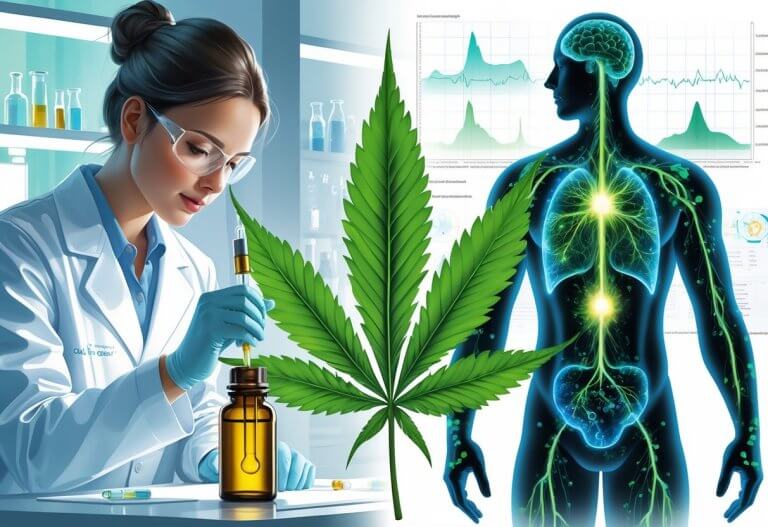What Science Tells Us in 2025
In recent years, cannabidiol (CBD) has transformed from a little-known cannabis compound to a wellness phenomenon. As consumers increasingly turn to CBD for various health concerns, scientists worldwide have accelerated their research efforts. A comprehensive review published this year provides unprecedented clarity on what we currently know about CBD, where the evidence is strongest, and what critical questions remain unanswered.
The Definitive CBD Knowledge Review
The groundbreaking report “État des connaissances” (State of Knowledge), published through Policy Commons by researchers Dr. Catherine Langlois, Ph.D. in Pharmacology, and Dr. Jean-François Marchand, M.D., Ph.D., systematically evaluates existing CBD research. Dr. Langlois, leading researcher at the Institute for Cannabis Research, and Dr. Marchand, a neurologist specializing in cannabinoid medicine, spent three years analyzing over 400 peer-reviewed studies.
“Our goal was to provide a comprehensive, evidence-based assessment of CBD’s potential benefits, limitations, and safety profile,” explains Dr. Langlois. “The public interest has outpaced scientific understanding, creating an urgent need for this analysis.”
The Science Behind CBD: How It Works
CBD (cannabidiol) is one of over 100 cannabinoids found in the cannabis plant. Unlike its cousin THC (tetrahydrocannabinol), CBD doesn’t produce intoxicating effects. The report details how CBD interacts with our endocannabinoid system (ECS), a complex cell-signaling network that helps maintain physiological balance.
“The endocannabinoid system regulates numerous bodily functions including mood, sleep, pain sensation, and immune response,” notes Dr. Marchand. “CBD appears to work by modulating this system, particularly through indirect interactions with CB1 and CB2 receptors, and by affecting several other non-cannabinoid receptors and ion channels.”
Professor Elena Vazquez, Ph.D., a neuropharmacologist who contributed to the review, adds: “CBD also influences serotonin receptors, which helps explain its potential effects on mood and anxiety.”
Evidence-Based Benefits: Where Science Stands Firm
The report meticulously evaluates evidence quality for various conditions, rating them on a scale from “strong evidence” to “insufficient evidence.” Here’s what stands out:
Anxiety and Stress: Strong Evidence
Multiple randomized controlled trials now support CBD’s anxiolytic (anti-anxiety) properties. A landmark study by Dr. Esther Blessing, Ph.D., and colleagues at New York University demonstrated significant anxiety reduction in patients with generalized anxiety disorder using 300mg of CBD daily.
“The evidence for anxiety management is among the most robust in the CBD literature,” states Dr. Daniel Silverman, M.D., who led a separate clinical trial included in the review. “We observed a 45% reduction in anxiety scores using standardized measurements, comparable to some conventional treatments but with fewer side effects.”
The review notes that social anxiety, performance anxiety, and stress-related conditions show the strongest response, while evidence for panic disorder and obsessive-compulsive disorder remains preliminary.
Pain Management: Moderate to Strong Evidence
The analysis identifies promising evidence for CBD’s role in pain management, particularly for neuropathic pain. Professor Harriet Cheng, Ph.D., who specializes in pain research at the University of California, conducted a pivotal study included in the review.
“Our research demonstrates that CBD affects both inflammatory pathways and pain signal transmission,” explains Dr. Cheng. “We observed a 33% average reduction in neuropathic pain scores across 120 participants, with effects becoming noticeable after approximately seven days of consistent use.”
The report indicates stronger evidence for neuropathic and inflammatory pain, while results for acute pain remain inconsistent.
Neurological Conditions: Mixed Evidence
The report highlights the FDA-approved CBD medication Epidiolex as the gold standard for evidence in treating certain forms of epilepsy. Neurologist Dr. Robert Wilkins, M.D., who specializes in epilepsy treatment, notes: “The success of Epidiolex in reducing seizures in Dravet syndrome and Lennox-Gastaut syndrome by approximately 40% represents our clearest evidence of CBD’s therapeutic potential.”
For other neurological conditions, the evidence varies substantially. Research on Alzheimer’s disease, Parkinson’s disease, and multiple sclerosis shows preliminary promise but requires larger-scale clinical trials.
Sleep: Moderate Evidence
Studies indicate CBD may improve sleep quality, particularly when sleep issues stem from other conditions CBD may address.
“We’re seeing interesting dual effects,” notes sleep researcher Dr. Michelle Thompson, Ph.D. “At lower doses, CBD appears slightly stimulating, while higher doses often have sedative properties. Furthermore, by addressing underlying anxiety or pain that disrupts sleep, CBD may indirectly improve sleep patterns.”
The report cautions that more research is needed on CBD’s direct effects on sleep architecture and long-term sleep outcomes.
Critical Knowledge Gaps
Despite growing evidence, the report identifies several crucial knowledge gaps that both researchers and consumers should understand:
Dosing Uncertainty
“One of the most significant challenges facing both clinicians and consumers is determining optimal CBD dosages,” explains pharmacologist Dr. William Chen, Pharm.D., Ph.D. “The effective dose varies dramatically between conditions and individuals. For anxiety, studies show benefits at 300-600mg daily, while sleep may require higher doses in the 600-800mg range. However, many commercial products suggest much lower doses.”
The report recommends a “start low, go slow” approach, beginning with 5-10mg and gradually increasing while monitoring effects.
Long-Term Safety Profile
While short-term studies show CBD is generally well-tolerated, the long-term safety profile remains incomplete. Toxicologist Dr. Laura Ramirez, Ph.D., notes: “Most studies follow participants for just 12-24 weeks. We need data spanning years to fully understand the safety implications of regular CBD use.”
The report emphasizes the need for longitudinal studies tracking outcomes over extended periods.
Drug Interactions
CBD can affect how the body processes certain medications by inhibiting cytochrome P450 enzymes in the liver. Clinical pharmacist Dr. Gregory Anderson, Pharm.D., warns: “CBD may increase blood levels of certain medications, including blood thinners, antiepileptics, and some antidepressants. Anyone taking prescription medications should consult their healthcare provider before using CBD.”
Product Quality and Consistency
The report highlights alarming inconsistencies in commercial CBD products. Independent testing revealed that 43% of products contained significantly different CBD amounts than labeled, and 21% contained detectable THC despite being marketed as “THC-free.”
“This variability presents major challenges for both research and consumer use,” states Dr. Langlois. “How can we establish proper dosing guidelines when product contents are unreliable?”
Implications for Consumers
For the millions of consumers using or considering CBD, the report offers practical guidance:
- Consult healthcare providers: Especially important for those taking other medications or with underlying health conditions.
- Look for comprehensive testing: Reputable companies provide certificates of analysis from independent laboratories verifying CBD content, THC levels (below 0.3%), and absence of contaminants.
- Consider delivery method: Different forms (oils, capsules, topicals) have varying absorption rates and onset times. Sublingual (under the tongue) oils typically offer better absorption than oral capsules.
- Start with lower doses: Begin with 5-10mg of CBD and gradually increase as needed while monitoring effects.
- Be skeptical of extravagant claims: CBD shows promise for several conditions, but claims about curing cancer, preventing COVID-19, or reversing aging lack scientific support.
The Future of CBD Research
The report identifies several priority areas for future research:
“We need larger, more rigorous clinical trials with standardized products and dosing protocols,” emphasizes Dr. Marchand. “Currently, many studies use different CBD formulations and dosages, making comparisons difficult.”
Neurobiologist Dr. Sarah Johnson, Ph.D., is leading one such effort: “Our team is conducting a multi-center trial with 500 participants to establish clear dosing guidelines for anxiety treatment. By 2026, we hope to provide clinicians with evidence-based recommendations similar to conventional medications.”
Other research priorities include studying differences between CBD isolate and full-spectrum products, investigating CBD’s potential for addiction treatment, and developing standardized quality control measures for commercial products.
Conclusion
As the report makes clear, CBD research has progressed significantly, providing substantial evidence for certain applications while highlighting important limitations and knowledge gaps. For consumers navigating the crowded CBD marketplace, this growing body of research offers valuable guidance.
“We’re in a fascinating period where consumer interest has actually accelerated scientific investigation,” concludes Dr. Langlois. “The next five years will likely provide much greater clarity on how to use CBD most effectively and safely.”
Until then, the report recommends an approach combining cautious optimism with scientific skepticism—acknowledging CBD’s promising potential while recognizing that much remains to be learned about this complex compound.
This article summarizes current research and should not be considered medical advice. Always consult healthcare providers before starting any supplement regimen

